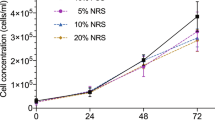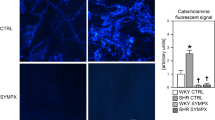Abstract
The effects of operation (lower-limb amputation) on the growth of the Lewis lung tumour and its metastases were studied. The role of C. parvum in counteracting these effects was investigated. Anaesthesia alone or with amputation did not affect primary tumour growth. C. parvum depressed this growth. Anaesthesia did not affect the number of pulmonary metastases, but amputation caused a significant increase. C. parvum inhibited metastases and completely counteracted the effects of operation on them. Large doses of cortisone acetate significantly increased metastases but small doses had no effect. Experiments with adrenalectomized mice suggested the effects of operation were due to non-specific stress.
This is a preview of subscription content, access via your institution
Access options
Subscribe to this journal
Receive 24 print issues and online access
$259.00 per year
only $10.79 per issue
Buy this article
- Purchase on Springer Link
- Instant access to full article PDF
Prices may be subject to local taxes which are calculated during checkout
Similar content being viewed by others
Rights and permissions
About this article
Cite this article
Mosley, J., Sadler, T. & Castro, J. Effects of amputation and Corynebacterium parvum on tumour metastases in mice. Br J Cancer 37, 571–575 (1978). https://doi.org/10.1038/bjc.1978.86
Issue Date:
DOI: https://doi.org/10.1038/bjc.1978.86
This article is cited by
-
Divergency between incidence of microscopic and macroscopic metastases
Virchows Archiv A Pathological Anatomy and Histopathology (1982)
-
Der Einfluß von Narkose und Operation auf das Immunsystem
Klinische Wochenschrift (1981)
-
A mouse model for immunotherapy of osteosarcoma
Cancer Immunology Immunotherapy (1980)
-
A mouse model for immunotherapy of osteosarcoma
Cancer Immunology Immunotherapy (1980)



